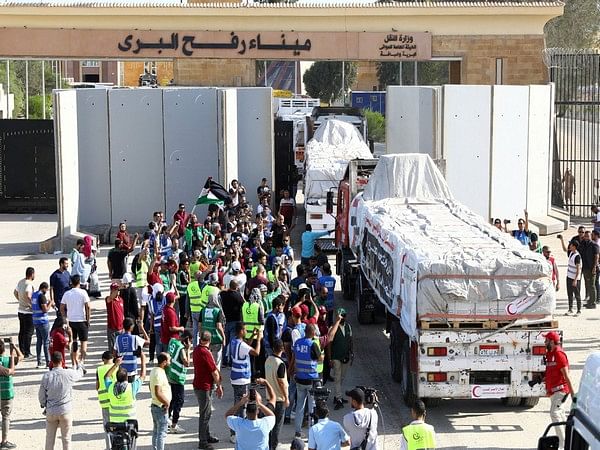Gaza Border [Israel], October 21 (ANI): On the fifteenth day of the Israel-Hamas war, 20 trucks carrying humanitarian aid were finally allowed to enter the Gaza Strip through Egypt’s Rafah border; however, WHO chief Tedros Adhanom Ghebreyesus warned that “needs are far higher” in the enclave that has more than 2 million people.
He also called for the “safe passage of additional aid convoys across the enclave”.
The Rafah border crossing was opened for a short window on Saturday morning to let 20 aid trucks enter Gaza from Egypt. Though many have welcomed the brief reopening, rights groups have asserted that much more aid is needed.

Among them was World Health Organisation Director-General Tedros Adhanom Ghebreyesus, who, in a social media post, said that in order “to meet the urgent health needs of all people in Gaza,” the WHO calls for “safe passage of additional aid convoys across the enclave; protection of all humanitarian workers; and sustained access for health aid.”
“In the darkest hours, war casts its shadow, but it is through the pursuit of peace that we ignite the light of hope, healing, and a better tomorrow,” his post added.
The European Commission chief, Ursula von der Leyen, called it an “important first step that will alleviate the suffering of innocent people.”

Martin Griffiths, United Nations Under-Secretary-General for Humanitarian Affairs and Emergency Relief Coordinator, said the delivery followed “days of deep and intense negotiations,” adding that the humanitarian situation in Gaza “has reached catastrophic levels.”
Meanwhile, the United States has also welcomed the delivery of humanitarian assistance to the people in Gaza, the first since Hamas’ October 7 terrorist attack on Israel.
“We thank our partners in Egypt and Israel and the United Nations for facilitating the safe passage of these shipments through the Rafah border crossing,” said the US State Department in a statement on Saturday.
“With this convoy, the international community is beginning to address the humanitarian crisis in Gaza that has left residents of Gaza without access to sufficient food, water, medical care, and safe shelter,” it added.
The trucks carrying humanitarian aid to deliver to Gaza only carried food, water, and medical supplies but no fuel, CNN reported.
Thirteen trucks were carrying medicine and medical supplies; five were loaded with food; and two were transporting water, said the Egyptian authorities at the Rafah crossing.
A Palestinian spokesperson for the border crossing on Saturday claimed that the aid loaded on trucks did not contain “enough” supplies for even a single school in Gaza; however, CNN did not verify this claim.
“Despite supplies running dangerously low at hospitals and schools in Gaza, fuel was not delivered,” said Head of Communications for the Palestinian side of the Rafah crossing, Wael Abu Mohsen, told Saudi state media Al Hadath TV in an interview on Saturday, as reported by CNN.
Meanwhile, IDF spokesman Rear Admiral Daniel Hagari said in a press conference that food, water, and medical aid will enter the southern part of Gaza through Egypt’s Rafah crossing, while fuel is still not allowed to enter Gaza.
“Fuel will not enter Gaza,” Hagari said.
Hagari added that the IDF “will continue strikes on Hamas strongholds in northern Gaza.”
This dire situation in Gaza was underscored by the UN Office for the Coordination of Humanitarian Affairs in a statement on Thursday, stating that over 60 per cent of primary care facilities are currently closed and Gaza’s hospitals are on the brink of collapse. This crisis is primarily due to severe shortages of power, medicine, medical equipment, and specialised personnel, CNN reported.
The ongoing Israeli airstrikes have forced seven hospitals and 21 primary healthcare centres in Gaza to become “out of service.” Additionally, 64 medical staff members have lost their lives in the ongoing conflict, CNN quoted a spokesperson for the Palestinian Ministry of Health as saying on Friday.
The arrival of aid came as world leaders gathered at the Cairo Peace Summit in Egypt, initiated by President Abdel-Fattah El-Sisi.
The summit aims to de-escalate the situation in Gaza and ensure the protection of civilians in the region. Representatives from 34 countries, including those from the Middle East, Africa, and Europe, as well as the United Nations, are participating. Notably, Israel did not attend the summit.
President Sisi emphasised that once aid has been delivered to Gaza, the primary focus should be on brokering a truce and ceasefire between Israel and Hamas.
Then, negotiations should resume for a peace process leading to a “two-state solution and the establishment of an independent Palestinian state that lives side by side with Israel on the basis of international legitimacy,” Sisi added.
Conditions in Gaza are worsening by the hour amid fears of a catastrophic humanitarian crisis, and multiple rights groups are warning of the deadly consequences of ongoing shortages in the Gaza Strip and appealing for vital supplies to be allowed through the Rafah crossing.
At least 4,385 Palestinians have been killed in Israeli strikes on Gaza since Hamas’s October 7 attack inside Israel, which killed more than 1,400 people. (ANI)
This report is auto-generated from ANI news service. ThePrint holds no responsibility for its content.



